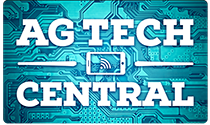Click above to watch interview with FarmLab’s Sam Duncan at evokeAG in Melbourne.
FARMLAB chief executive officer Sam Duncan began his pitch at the evokeAG conference in Melbourne with a smile and a simple message – we make soil testing easy.

FarmLab CEO Sam Duncan pitching at yesterday’s opening day of evokeAG in Melbourne.
As one of several young agtech entrepreneurs seeking support in the conference’s Pitch Tent today, Sam is vying for a share in a $35,000 funding prize pool.
But more than that he was seeking investment to support his global expansion plans to put farmers’ soil back into their hands by breaking down the barriers to undertake and maximise the value in soil testing.
Mr Duncan told his judges and the evokeAG delegates that the current soil testing system is “crap”, but FarmLab app could give farmers a clear indication of what is happening in their soil over the long-term and provide soil maps of farms that become assets in themselves.
“That’s where we want to get to.
“We do want to be with farmers, but we know the channel to do that initially is through agronomists.”
He said the current soil-testing system is an old paper-based and expensive system that takes time.
“Worst of all the data is really poorly digitised,” he said.
“If there is anyone here who has done you will get the results back in CSV or PDF format and it is pretty hard to track the trends and manage them over time.”
![]() Sam co-founded Farmlab with Shahriar Jamshidi as a simple mobile application for farmers and agronomists to order a soil test from a partner laboratory, arrange collection and testing parameters, and receive and interpret the results.
Sam co-founded Farmlab with Shahriar Jamshidi as a simple mobile application for farmers and agronomists to order a soil test from a partner laboratory, arrange collection and testing parameters, and receive and interpret the results.
“All of that data goes straight through to the platform and then we help them interpret it, turning those spreadsheets that we used to get into lovely digital soil maps for agronomists and farmers to better interpret and better manage their soil over the long-term.
“This means we can track trends and improve the overall fertility of soil across the farm and across Australia.”
Sam said the majority of soil testing across Australia is conducted by agronomists and agribusinesses.
“Those are the guys we want to talk to today about getting our platform into their hands.”
FarmLab is releasing its mobile app in about two weeks with two lab partners East West Enviroag in Tamwworth and at Southern Cross University’s Environmental Analysis Laboratory at Lismore.
A web app will be launched in a few months with features to improve the efficiency of soil sampling and digital soil mapping. Sam said a 10 percent administration fee is charged for every soil test that goes through the platform.
“Keeping in mind we get wholesale prices through our labs, they are often about 20pc cheaper than what the consumer would pay the lab directly.
“So we are still saving our customers money,” he said.
“In about October we will be integrating with some sensor companies to gather more data on soil and March next year we plan to go global.”
The company has started shipping soil sampling bags – 20 last month – set to generate about $6000 in revenue. The business has been supported by about $625,000 in grant funding for projects with partners that include the University of Sydney.
Although most soil testing is done by agronomists on behalf of farmers, Sam believes FarmLab can add value for farmers by storing data and privatising it within their accounts and databases.
“I want to get the market right – If we can get this live, working in Australia, we’ve already got it running in a very hostile environment, I think overseas will be really easy, compared to Australia.”


Oils ain’t oils & soil tests ain’t soil tests. If these tests are just the current test in a different format, what is the point?
I think soil tests should reflect biological soil health measured by activity between plants and soil organisms.
The old N,P & K measure offers nothing in terms of soil “health”.
Great to see the innovation focus at Evoke Ag in Melbourne and the FarmLab guys – however not everything he says about the structure of soil testing is accurate – sure historically the system has been paper based however there is already a major project working at digitising Australian soil test data. Additionally companies like ours hold large amounts of soil test data digitally on behalf of our farming clients and agronomy partners. We expect to conduct in excess of 50,000 soil tests this financial year alone.